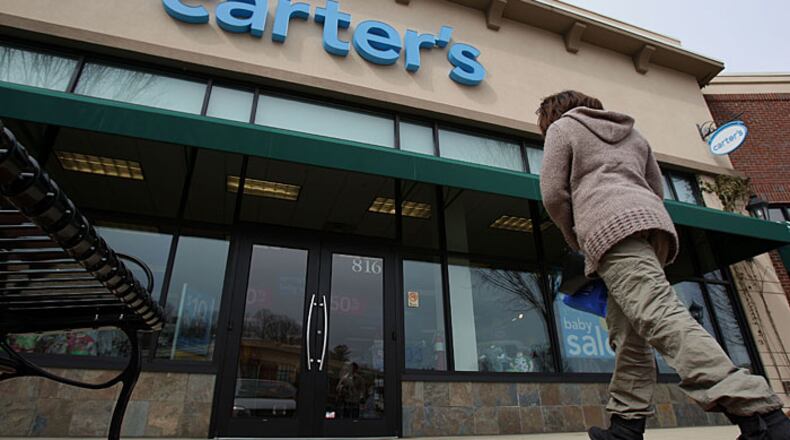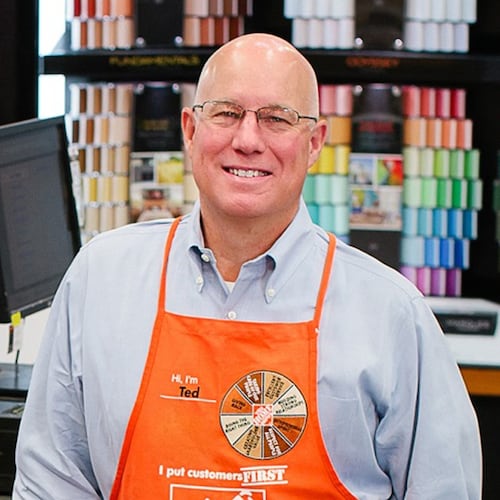Parents and kids might be dreaming of summer vacations, but executives with children’s apparel and accessories maker Carter’s are warning back-to-school shopping might come with a bigger hit to consumers’ wallets.
That‘s in large part because of tariffs.
Richard Westenberger, Carter’s chief financial officer, said during the company’s recent first quarter earnings call that the retailer’s back-to-school season assortment could be subject to tariffs.
Atlanta-based Carter’s makes its namesake line of kids’ clothes, OshKosh B’Gosh denim and the popular Skip Hop line of accessories and toys.
Westenberger said the company probably has about 150 days — or about five months — of supply on hand across its businesses, so its first imports to be subject to the tariffs would be in mid-May. “Most of what we have on hand is spring, summer inventory,” Westenberger said.
More of the retailer’s back-to-school assortment would be subject to the new tariffs because it would be imported later, he said during the April 25 earnings call.
“The fall, winter product would start to arrive in … late May, June. And the holiday product would come after that,” Westenberger said.
Retailers have begun to warn of shortages of some goods and even potential disruptions to Christmas shopping if tariffs remain as proposed.
“The proposed tariffs have the potential to raise prices on a range of essential items, including our products that families with young children rely upon,” Westenberger said during his presentation.
“But everyone’s uncertain right now (about) the prospect of having to raise prices,” he said during a discussion on the effects of tariffs. That‘s because consumer confidence has declined and there’s continued economic uncertainty.
In an Atlanta Journal-Constitution poll of Georgia voters made public Wednesday, a slim majority of Georgia voters somewhat or strongly disapprove of President Donald Trump‘s tariffs on imported goods. Some 58% of respondents said they planned to take steps to reduce their spending.
National Retail Federation Chief Economist Jack Kleinhenz in mid-April said in a written statement that “there is no question that the consumer is not feeling great given the confusion of policy announcements from Washington.”
“On-again, off-again rising tariffs and resulting turmoil in the stock market and world economy are clearly impacting consumer concerns about higher prices and future consumer spending growth,” he said.
Shifting supply chains
Westenberger said over the years, Carter’s has “meaningfully reduced our reliance on China” for a number of reasons, including declining labor cost competitiveness and increasing tariffs.
Vietnam, Cambodia, Bangladesh and India are its largest countries of origin for products, while China production represents less than 2% of its apparel and accessories, Westenberger said. The company has reduced sewing operations in China, and eliminated its use of cotton fiber from China, turning to cotton from other countries instead.
The Skip Hop business, which sells baby gear including electronics, relies more on China, with about 45% of its production based there. But the company is also working to reduce its reliance on China-based manufacturing for that business.
“We have raised prices on some items, particularly related to Skip Hop. We have partnered with some of our vendors to share some of those costs,” Westenberger said. “We are continuing to move production around to lower tariffs geographies.”
Looking at the recent announcement of new tariffs on imports, Westenberger said Carter’s already pays “significant duties” on the import of its products, with about $110 million paid in 2024.
Carter’s said it understands the White House’s push to boost U.S. manufacturing, but it has also participated in lobbying Congress and the Trump administration “to make our point of view known on these matters,” Westenberger said.
“Import data suggests that less than 5% of baby apparel specifically is produced in the Western Hemisphere. Manufacturing of these products in the United States would be even less than this,” he said.
Carter’s has considered “nearshoring” production to Latin America “a number of times over the years,” but labor costs are uncompetitive, there aren’t enough components available, and there’s a “general absence of capabilities and expertise required to produce our products,” Westenberger said.
According to the American Apparel & Footwear Association, 97% of all clothes, shoes, and accessories sold in the United States are imported.
“We do not believe baby and children’s apparel production will return to the United States anytime soon, and if it did, we believe the resulting cost of these items to the end consumer would prove extremely prohibitive,” Westenberger said.
Trump has announced a bevy of new tariffs, including 145% tariffs on many imports from China, but he also put other so-called “reciprocal” tariffs on hold, changed other new tariffs and signaled interest in reaching trade deals to make other adjustments.
Carter’s also joined the list of companies that has declined to give a financial outlook for this year because of uncertainty from tariffs and other economic concerns.
The company faces its own challenges as a new CEO, Douglas Palladini, works on returning Carter’s to long-term growth and increased profitability. Westenberger served as interim CEO after the retirement of longtime chief executive Richard Casey, until Palladini took the helm of the company in April.
But the tariffs add another layer of challenges.
“It‘s difficult to imagine a more tumultuous market backdrop than we’ve experienced over the last couple of months,” Westenberger said.
About the Author
Keep Reading
The Latest
Featured



